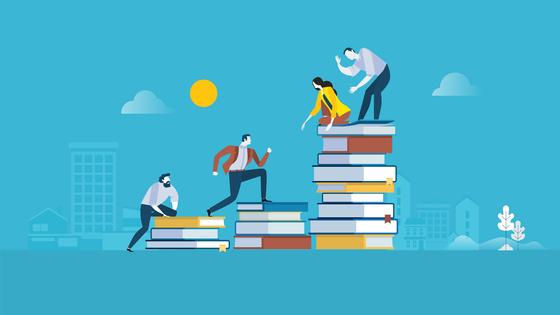Education in an era of turbulent times: only those who constantly learn are in demand in the labour market
The world has changed, so we too must change with it to meet its demands.

These days, the world is moving at a breakneck speed: new technologies, new approaches to work, and novel strategies appear all the time. It's challenging for a contemporary person to change so quickly, physically and mentally. The best way to help yourself adapt to today's demands of modernity is to learn.
"Learn, unlearn, and retrain"

The foundation of any career is still a fundamental education. However, this alone is no longer enough: you have to learn throughout life. Futurologist Alvin Toffler believed that those who can't work with their skills - learn, forget the old and do things in a new way - will be considered illiterate in the 21st century. Whereas Toffler's statement was only a hypothesis in the last century, it's our reality today.
For the contemporary person, it is not the ability to concentrate that's the most important thing, but the ability to 'centre,' that is, to evenly develop. The essential skills you need to level up are the 4C's: creativity, critical thinking, cooperation, and communication. These are all "soft" or supra-professional skills. Does this mean that the 'hard' skills have lost their importance in the 21st century? Of course not! Practical skills, or hard skills, have always been highly valued and continue to be in high demand.
Soft skills and hard skills - rock everything

A simple definition of 'hard skills' is what we know how to do. Soft skills are how we do it. How we build our team, communicate with people, allocate time, and so on. Partly, soft skills are innate, but having them isn't enough. We also need to hone them. Moreover, anyone who aspires to reach a professional high position must improve both their soft and hard skills.
Soft skills come to the fore because they allow you to adapt quickly. In today's world, things are changing so rapidly that planning often prevents us from reacting rapidly to changes rather than helping us. Therefore, the contemporary person must be as flexible as possible, always ready for any changes, and constantly learn and improve your skills.
Learning from the best

Access to information is the key to success. Of course, this has always been true. The difference is that now, the value of information is becoming evident in the digital age. There is so much information out there, and the challenge is to find a source you can trust.
In the twenty-first century, the best source of information for rapid career advancement is another person. There are different ways to get access to such a source: build your own network, establish the necessary contacts in the professional community, join a professional association, or find a mentor. A mentor is a professional whose career path you dream of following. Their experience and advice will help you to move towards your goals much faster!
The world's your oyster, and all doors are open to us. To enter them, you need to change, to look at familiar things from a new perspective - to see new opportunities in them. To grow, you have to learn new things all the time - you have to find your inner balance. That isn't something taught at school or university. However, it is something that a mentor can teach you. The mentor doesn't facilitate ready-made answers, but they help you find your way faster and keep painful experiences to a minimum.
Educational institutions are now facing the challenge of completely changing their approach to education. Start teaching students what they will need to develop their careers. That is what the education of the future must become.
Share this with your friends via:
Latest News

In the UK, £23 million has been allocated for the expansion of the EdTech Testbed program — pilots of educational technologies in schools and colleges.

In the US, Tuskegee University announced the launch of Tuskegee University Global Campus (TUGC) — a new online platform for distance learning.

A significant stage in the development of the alternative education system has begun in West Northamptonshire in the UK: the County Council is actively calling on parents, guardians, and trustees to participate in shaping the future of this key area.

Outwoods Primary School in Atherstone, Warwickshire, having experienced deep sadness after the loss of their famous cat, Silla, has found solace in a new pet – a Maine Coon named Aloysius O’Hara.

In modern universities, artificial intelligence, and in particular ChatGPT, is rapidly transforming from a controversial tool into a full-fledged student assistant.












 Spring skills audit: what to remove, strengthen, and “sow” in learning
Spring skills audit: what to remove, strengthen, and “sow” in learning
 9 Career Mistakes Young Professionals Make
9 Career Mistakes Young Professionals Make
 £23 million allocated for the expansion of EdTech Testbed in the UK
£23 million allocated for the expansion of EdTech Testbed in the UK
 Test: How Psychologically Mature Are You? Check Your Inner Foundation.
Test: How Psychologically Mature Are You? Check Your Inner Foundation.
 Test. Check Your Social Media Dependency Level!
Test. Check Your Social Media Dependency Level!
 Test: What Business is Right For You?
Test: What Business is Right For You?
